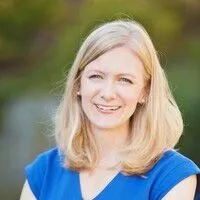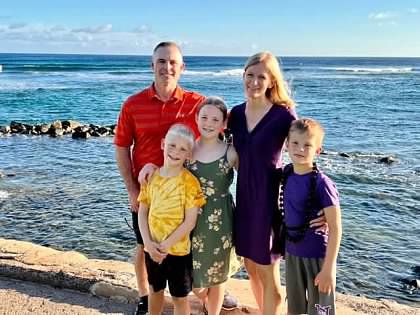Foster Marketing Faculty Spotlight – Christy Johnson
Get to know Foster marketing faculty, Christy Johnson, who teaches the professional continuing education course, Women’s Entrepreneurial Leadership, and the MBA elective course, Business Plan Practicum. In 2023, Christy won the University of Washington Seattle elective teacher of the year award.

Please tell us a bit about your background.
I was born in a small rural town, north of Bellingham Washington and was fortunate to have a family that valued learning and education. I earned a BA in Economics at Western WA University. And because I loved to learn, I also earned four minors. I added a teacher certificate at the end of my BA.
My immediate family includes my husband, 14-year-old daughter, and twin 10-year-old sons. My hobbies include exploring the world with my kiddos, reading, traveling, cooking, and playing strategy games. We have a chocolate Lab named Maggie, who came to us during COVID. She just turned three, which I think is 21 in dog years, and she’s a ton of fun.
One role I’ve always wanted to have, is that of a mom, which explains why eight years ago, I added another ‘child’ to the mix, my company, and dedicated myself to building my organization. They say necessity is the mother of invention, which must be true, because I started my company when my twins arrived 7 weeks early, with some health issues. I love to work, and I like hard-core work, but I needed a role in that moment that had flexibility. I couldn’t find anything that fit my needs, so I created a company. My goal is to have a work environment that is supportive of families, especially those caring for aging family members or children.

What do you find meaningful about your time thus far at Foster?
I have loved meeting and learning more about the incredible students, staff, and faculty at Foster. I learn so much from all of them. And I was fortunate during my MBA to be challenged to “Change Lives, Change Organizations and Change the World.” Through my work at Foster, I hope to pass that message on to another generation, and our high-potential region in Seattle. It benefits all of us if we have a strong community, if we serve others, and if we solve problems in a way that creates positive value. This can be summed up in Robert Greenleaf ’s words which one of my former professor’s shared:
“This is my thesis: caring for persons, the more able and the less able serving each other, is the rock upon which a good society is built. Whereas, until recently, caring was largely person to person, now most of it is mediated through institutions – often large, complex, powerful, impersonal; not always competent; sometimes corrupt. If a better society is to be built, one that is more just and more loving, one that provides greater creative opportunity for its people, then the most open course is to raise both the capacity to serve and the very performance as servants of existing major institutions by new regenerative forces operating within them.”
How does your work align with Foster’s purpose? Purpose statement: Together…We Foster Leaders; We Foster Insights; We Foster Progress…To Better Humanity
There are many ways:
- We foster leaders. Many of the leaders I work with speak about the pace of change. Because of that employers want graduates who can continuously learn and grow. I aim to foster a culture of intellectual curiosity and a desire to seek different points of view, have people question your thinking, and stay open. Leaders also seek mentorship and guidance. There are many leaders who provide that to me. I am to offer mentorship, guidance, and support to students (and alums) them navigate their academic and professional paths. My only ask is they pay it forward. The best leaders foster leadership in others.
- We foster insights. This happens through knowledge creation as well as innovative teaching that supports knowledge transfer. There are so many amazing insights created at the UW. I aim to attend info sessions; ask professors I respect about their research and stay int to what matters. I’ll collaborate with other faculty members, students, and external partners to foster insights through interdisciplinary research projects. I encourage students to conducting meaningful research that aligns with the purpose of bettering humanity. I incorporate real-world examples and case studies to fostering a broader understanding of how knowledge can contribute to bettering humanity.
- We Foster Progress…To Better Humanity Being entrepreneurial is about doing this. I encourage students organize community-based projects that address local challenges, and contribute to the betterment of society. Bettering humanity requires collaborations and partnerships within the university and across the social sector, for profit sector and government. We need ethical principles and values in leadership and that requires my classroom to foster an inclusive environment that respects and celebrates diverse perspectives and creates belonging.
How have you worked to make your classroom/course curriculum inclusive?
Inclusivity is very important to me, and I believe it is something we all must continue to focus on and learn about. My goal is to have guest speakers, coaches, and case studies that resonate with as many students as possible. I regularly reach out to other professors and universities to see what books, classes, and resources they recommend. UC Berkeley has a diverse case library. Stanford indexed its entrepreneurship cases for diversity. I’ll Zoom with professors at those universities to share what is and isn’t working.
Any favorite memories from your experience with Full-Time MBAs/Evening MBAs?
I have so many favorite memories! I love one-on-one conversations with both Full-time and Evening MBAs. I usually arrive to my classes an hour ahead of time to chat with available students. I’ll also meet one-on-one in person or via Zoom as I realize MBAs are very, very busy. The moment when a student finds a problem they want to solve – whether it is developing sustainable pots for soil, discovering if, and how, first generation students think about entrepreneurship, or how to pitch for a bigger role from within their company – is the moment I find extremely rewarding.
How have you supported students outside the classroom?
I’ve had several independent study students, which I love. I have also helped students with their startups and made intros for internships or jobs. My goal is to help each student reach their full potential and figure out how/where they want to build something.
How is your teaching influenced by instructional best practices?
Fortunately, I started my career as a high school teacher. So, pedagogy matters to me. I bring in design thinking and I start with the end in mind – what do I want the students to retain 40 days, 40 months, and 40 years from now?
How do you maximize learning and keep students engaged?
I leverage in-class polls to keep a pulse on things. I also look at engagement within the class, as well as with assignments.
- Active Learning: I incorporate active learning techniques that encourage students to be actively involved in the learning process. This can include group discussions, problem-solving activities, case studies, simulations, and hands-on projects.
- Real-World Relevance: I connect the course material to real-world applications and examples. I help students understand the practical significance of what they are learning, and how it relates to their lives and future careers. This means we incorporate current events, case studies, and industry examples to make the content more relatable and meaningful.
- Regular Feedback and Assessment: I provide timely and constructive feedback on student progress and assignments. Live polling in class helps. Given I teach entrepreneurial classes, I see students as my customers.
- Engaging Classroom Environment: I try to create an inclusive and welcoming classroom environment where students feel comfortable to express their ideas and engage in discussions. I work to foster a sense of community and mutual respect among students by using humor, storytelling, and personal anecdotes to create a positive and engaging atmosphere. It is important to me that our classroom is one where we trust each other.
Are you currently doing work outside of Foster that influences what happens in the classroom?
Absolutely. I run a strategy and innovation consulting firm and I work with C-level leaders in the private sector (mostly tech, media/entertainment, and private equity), the public sector (federal, state, local), and social sector (foundations, family offices, nonprofits).
How have your relationships with industry experts influenced what happens in your class?
This topic is so important to me! So many people reach out wanting to support my students and I’m grateful for it. Industry experts can provide insights into the latest developments, trends, and practices within their respective fields. This knowledge helps me incorporate relevant and up-to-date content into my teaching. By staying connected to industry professionals, I can ensure that my curriculum reflects real-world scenarios and prepares students for what employers want. Sometimes industry experts want to do collaborative projects or offer internships to students. Given the intellect and work ethic of many of the students as well as a younger generations perspective on the world, stronger collaborations with industry experts and UW students makes sense.
What can students expect to master by the end of your course?
Women in Leadership will have you mastering the entrepreneurship ecosystem, discovering how to build entrepreneurial networks, and learning how to build a roadmap to map decision making. For the business plan practicum, you’ll gain a real sense of if you want to play in the startup world and if so, where. We talk about the space needing people who make things up, make them scale and make them real. The biggest takeaway I hope all students take away from any of my courses is to be entrepreneurial with your own life. Each of us has something unique to contribute to the world. It takes a while to figure out what that is.
What advice do you have for students to ace your course?
Be open to learning and immerse yourself in the experience. Iteration wins with startups. Lean in to building authentic, not transactional, relationships, build a habit of reflecting once a quarter based on what you learned about yourself.
How will students apply the knowledge and skills they gain in your classroom in their careers?
The ability to be entrepreneurial, to build social capital, and to reflect, is critical no matter what students do after the fact. For the women in Entrepreneurial Leadership, we make a roadmap that is used to help guide decisions for the next 3-5 years. My 540 / 440 students leave with knowledge on how to build a business canvas, learn entrepreneurial processes and mindsets, ideally cohesive with Lean Startup and Design Thinking methodologies, how to set a North Star and test, and how to be their own boss while building a startup.
Any tips for incoming MBAs on how they can brush up on skills/knowledge over the summer?
Look for problems in the world you want to solve. Notice what draws a strong emotion (what makes you mad, sad, glad). That is a signal of what matters to you and what you value. Read a variety of materials and try to read different perspectives on a topic. Build community and spend time with people who make you better.
